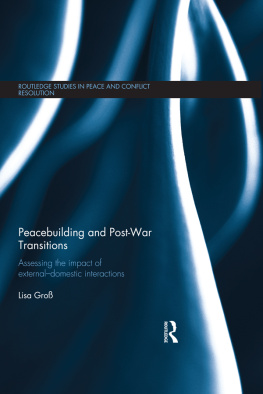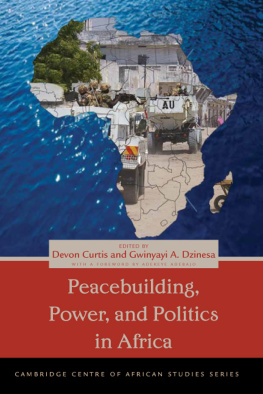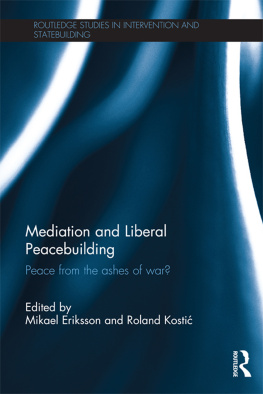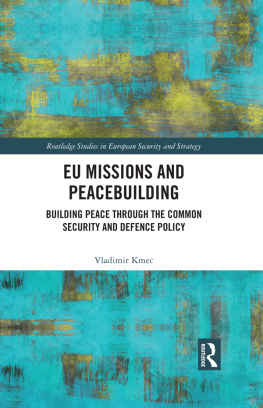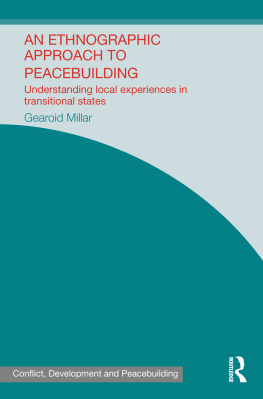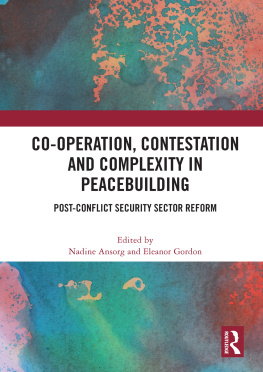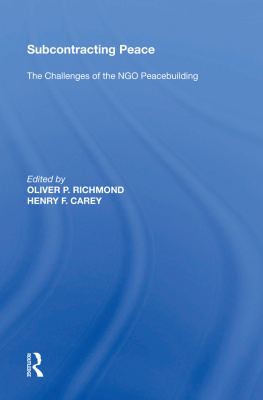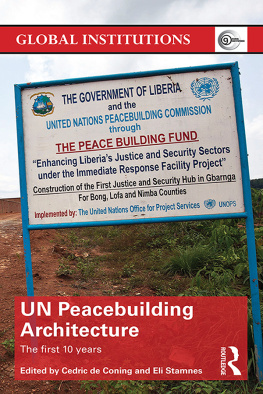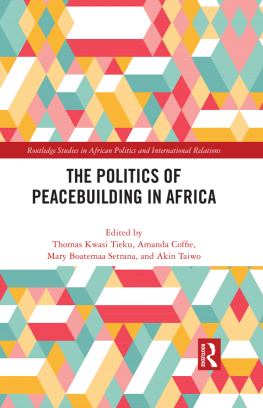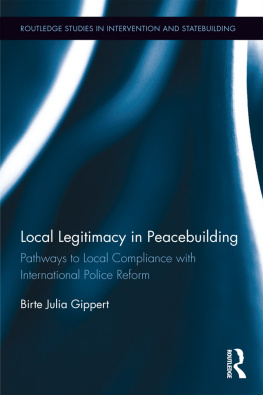Peacebuilding and Post-War Transitions
This book asks how, and under what conditions, externaldomestic interactions impact on peacebuilding outcomes during transitions to peace and democracy.
Why do so many peacebuilding interventions in post-war states result in stalled transitions despite heavy international support? This book suggests a new interaction-based explanation for this puzzle and proposes an analytical framework of peacebuilding interactions. Based on eight cases of peacebuilding inter actions, it demonstrates that the limited rationality of the actors involved in externaldomestic interactions influenced the post-war transition results in Kosovo. Drawing on interviews and focus groups, the insights build on the process tracing of peacebuilding reforms in the area of Local Governance and Police Reform, with a specific focus at the local level. Through an in-depth analysis of peacebuilding negotiations, this book shows how peace-builders use of ad hoc interaction tactics intended as heuristics to simplify decision-making in overly complex post-war environments have the unintended effect of offering domestic actors additional leeway to prioritise their domestic agenda, often at the expense of achieving full democratisation. The resulting consequences of these actions mean that, even in highly resourced inter ventions, such as those implemented in Kosovo, stalled transitions become one of the most likely outcomes of the peacebuilding process.
This book will be of much interest to students of peacebuilding, war and conflict studies, European politics, security studies and IR in general.
Lisa Gro is a researcher at the German Institute for Development. She received her PhD from the Department of Politics and Public Administration, University of Konstanz, Germany.
Routledge Studies in Peace and Conflict Resolution
Series Editors: Tom Woodhouse and Oliver Ramsbotham
Migration and Security in the Global Age
Diaspora communities and conflict
Feargal Cochrane
Gender, Peace and Security
Implementing UN Security Council Resolution 1325
Edited by Theodora-Ismene Gizelis and Louise Olsson
Conflict Transformation and Reconciliation
Multi-level challenges in deeply divided societies
Sarah Maddison
International Intervention, Identity and Conflict Transformation
Bridges and walls between groups
Timea Spitka
Peacebuilding and Friction
Global and local encounters in post conflict societies
Edited by Annika Bjrkdahl, Kristine Hglund, Gearoid Millar, Jar van der Lijn and Willemijn Verkoren
Resolving Deep-rooted Conflicts
Essays on the theory and practice of interactive problem-solving
Herbert C. Kelman
Edited by Werner Wintersteiner and Wilfried Graf
Climate Change and Resource Conflict
The role of scarcity
Judith M. Bretthauer
Ceasefire Agreements and Peace Processes
A comparative study
Malin kebo
Conflict Transformation and the Palestinians
The dynamics of peace and justice under occupation
Edited by Alpaslan zerdem, Chuck Thiessen and Mufid Qassoum
Peacebuilding and Post-War Transitions
Assessing the impact of externaldomestic interactions
Lisa Gro
Resolving Structural Conflicts
How violent systems can be transformed
Richard E. Rubenstein
First published 2017
by Routledge
2 Park Square, Milton Park, Abingdon, Oxon OX14 4RN
and by Routledge
711 Third Avenue, New York, NY 10017
Routledge is an imprint of the Taylor & Francis Group, an informa business
2017 Lisa Gro
The right of Lisa Gro to be identified as author of this work has been asserted by her in accordance with sections 77 and 78 of the Copyright, Designs and Patents Act 1988.
All rights reserved. No part of this book may be reprinted or reproduced or utilised in any form or by any electronic, mechanical, or other means, now known or hereafter invented, including photocopying and recording, or in any information storage or retrieval system, without permission in writing from the publishers.
Trademark notice: Product or corporate names may be trademarks or registered trademarks, and are used only for identification and explanation without intent to infringe.
British Library Cataloguing-in-Publication Data
A catalogue record for this book is available from the British Library
Library of Congress Cataloging-in-Publication Data
Names: Gro, Lisa, 1983 author.
Title: Peacebuilding and post-war transitions : assessing the impact of
external-domestic interactions / Lisa Gro.
Description: Abingdon, Oxon ; New York, NY : Routledge, 2017. |
Series: Routledge studies in peace and conflict resolution | Includes
bibliographical references and index.
Identifiers: LCCN 2016029985| ISBN 9781138210264 (hardback) |
ISBN 9781315455778 (ebook)
Subjects: LCSH: Peace-building. | Postwar reconstruction. |
Peace-buildingKosovo (Republic) | Postwar reconstruction.Kosovo
(Republic)
Classification: LCC JZ5538 .G76 2017 | DDC 327.1/72dc23
LC record available at https://lccn.loc.gov/2016029985
ISBN: 978-1-138-21026-4 (hbk)
ISBN: 978-1-315-45577-8 (ebk)
Typeset in Bembo
by Wearset Ltd, Boldon, Tyne and Wear
This book is the result of several years of research in Kosovo on the influence of peacebuilding on post-war transitions. I have learned a lot during this time and I hope to be able to share some of my insights with you while reading along.
Of course, a long research project such as this always depends on the support and the collaboration of the people around. I have received excellent academic support from Sonja Grimm, Gerald Schneider and Christoph Zrcher, who were never tired of giving me advice on how to develop my research idea and who encouraged me to think in different directions. Particular thanks goes to Sonja who has taken the time to read all my drafts and was never short of valuable advice. I have also profited from the valuable comments I received at conferences and I would like to thank the people who gave them, in particular, Sverine Autessere, Lothar Brock, Arnaud Kurze and Jelena Suboti.
The book draws its insights mainly from field research, which is barely possible without the support of insiders to the field in question. I am therefore deeply indebted to the friends I found in Kosovo, who shared their life stories with me and, equally important, their good taste for beautiful black Balkan humour. Without them, I would never have come to write the book as it stands now because it is only through the personal conversations that I started to make better sense of my observations. I am especially thankful to Admir, Ferid, Ljubia and Mimoza for translating, moderating and helping me in all kinds of circumstances as well as to Adnan, Hanka and Shkumbin and all the youngsters of the youth centre in Bregore/Brdace for making me feel welcome right from my arrival in Kosovo. I also owe much gratitude to my interview partners in Kosovo institutions and international organisations who were so kind to share their opinions and knowledge, sometimes even long after I had left the country. Without their readiness to spend their precious time with just another PhD student, I would not have been able to write the book. As I pledged anonymity, I cannot thank anyone in particular, but there were many whose support went beyond merely meeting up for a chat over a coffee and I am very grateful for this.

